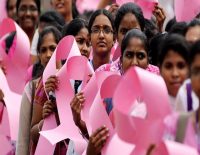Tata Memorial institute raises questions over Navjot Singh Sidhu’s claim remedy on cancer

Reacting to Navjot Singh Sidhu’s claim on wife’s cancer treatment and outcome, a group of oncologists from Tata Memorial Hospital and other organisation across the country have registered grave concern.
Pramesh CS, Director of the Tata Memorial Hospital and the Professor and Head of Thoracic Surgery at the Tata Memorial Centre, Mumbai has posted on X, a statement signed by 262 oncologists (present and past, from Tata Memorial Hospital).
The statement read: “Starving cancer by avoiding dairy products and sugar, or using turmeric and neem, has no high-quality evidence supporting their efficacy. Proven treatments like surgery, radiation therapy, and chemotherapy remain the cornerstone of cancer care.”
The advisory warned the public against delaying or abandoning standard treatments for unproven remedies. The oncologists emphasized early detection and proper medical intervention as key to successful cancer treatment.
Sidhu had claimed that his wife overcame a mere 3% survival prognosis within 40 days by following a diet regimen of lemon water, turmeric, apple cider vinegar, neem leaves, and basil, without relying on conventional treatments.
The claim, shared on social media, has gone viral, sparking debates about alternative cancer therapies. While some users praised the narrative as inspirational, the medical community has raised serious concerns about its accuracy and potential to mislead patients.
Tata Memorial Oncologists Issue Public Advisory
Meanwhile, Dr. Pragya Shukla, a prominent oncologist, called Sidhu’s statement “irresponsible and misleading.” “Diet plays an important role in supporting cancer treatment, but dramatic cures within days through dietary changes are scientifically implausible. Such statements can mislead vulnerable patients, causing them to delay or forgo life-saving treatments.”
Dr. Shukla highlighted that stage-4 cancer is a complex condition requiring a multifaceted approach, including targeted therapies, immunotherapy, and palliative care. She urged public figures to exercise caution while sharing health-related claims.
Sidhu’s claim has divided opinion on social media. Supporters viewed it as a testament to alternative medicine’s potential, while critics labeled it misleading pseudoscience. Many healthcare professionals have since taken to social platforms to encourage patients to rely on verified medical advice rather than anecdotal evidence.
Medical experts and organizations stress the importance of disseminating evidence-based health information, particularly by public figures with significant influence. Misleading claims, even if well-meaning, can lead to catastrophic consequences for patients seeking effective treatment.
The Tata Memorial Hospital’s advisory serves as a timely reminder of the dangers of unverified remedies. Cancer treatment requires a scientific approach, and patients are urged to consult qualified oncologists for accurate diagnosis and care.







